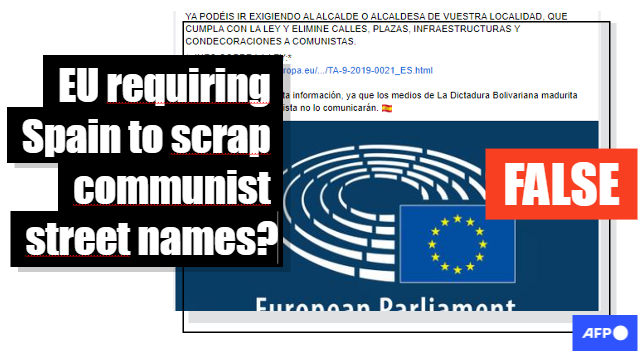“The European Parliament condemns communism and Stalinism and requires the Spanish state to remove signs of gratitude, tributes and street names dedicated to its agents in Spain (Carrillo, Pasionaria, Negrin, Largo Caballero, International Brigades…),”reads the claim posted to social media. It alleges that the decision was taken “today” in Strasbourg — the seat of the European Parliament — and is of a “compulsory” nature.
The claim was shared hundreds of times on Facebook (1, 2) and X (formerly Twiter) (1, 2). The same allegation had already circulated on social media in 2019, 2020, 2021 and 2022.

European remembrance
The claim was posted along with a link to the European Parliament’s resolution on the importance of European remembrance for the future of Europe (2019/2819(RSP)). The text was adopted by 535 votes to 66, with 52 abstentions, on September 19, 2019.
The initiative was launched by five political groups represented in the European Parliament: the European People’s Party, the Progressive Alliance of Socialists and Democrats, Renew Europe, Greens/EFA and the European Conservatives and Reformists. The resolution “calls on all member states of the EU to make a clear and principled assessment of the crimes and acts of aggression perpetrated by the totalitarian communist regimes and the Nazi regime.” In addition, it “condemns all manifestations and propagation of totalitarian ideologies, such as Nazism and Stalinism”.
The resolution also calls on all member states to commemorate August 23 as the European Day of Remembrance for the victims of totalitarian regimes and to condemn and counteract all forms of Holocaust denial.
Under point 17, the European Parliament “expresses concern at the continued use of symbols of totalitarian regimes in the public sphere and for commercial purposes.” It recalls that “a number of European countries have banned the use of both Nazi and communist symbols”.
AFP’s fact-checking team found nothing in the resolution to indicate that countries like Spain would have to remove tokens of recognition to communist figures from public spaces. Nor did the team find anything to suggest EU members would be required to provide accounts of “communist crimes” at educational institutions and on television, as claimed on social media.
We also did not find anything in the Spanish press from 2019 on the supposed mandatory aspect mentioned in the viral posts.
The European Parliament’s press service told AFP on September 4, 2023 that the resolution “is a political declaration”, adding that “it is not binding”. Member states are not obliged to obey its demands. The resolution was adopted 80 years after the Molotov–Ribbentrop Pact between the Soviet Union and Nazi Germany, which triggered World War II.
The European Union has various kinds of legislation. On the one hand there are regulations, directives and decisions, which are binding and must be respected once approved. On the other hand, there are non-binding legal acts such as recommendations and opinions, which allow European institutions to make their views known and to suggest courses of action without imposing any legal obligation. This is the case when it comes to manifestations of totalitarian ideologies.
At the time of this article’s publication, Spain still had street names dedicated to communist leaders including Juana Dona in the Arganzuela district of Madrid and La Pasionaria in the Puerto de Sagunto locality of Valencia.
Adrià LABORDA
AFP España
Translation : Anna Maria JAKUBEK

- Home
- About AFP
- How we work
- Editorial & Ethical standards
- Fact-Checking Stylebook
- Meet the team
- Training
- Subscribe
- Contact
- Corrections
Copyright © AFP 2017-2023. All rights reserved. Users can access and consult this website and use the share features available for personal, private, and non-commercial purposes. Any other use, in particular any reproduction, communication to the public or distribution of the content of this website, in whole or in part, for any other purpose and/or by any other means, without a specific licence agreement signed with AFP, is strictly prohibited. The subject matter depicted or included via links within the Fact Checking content is provided to the extent necessary for correct understanding of the verification of the information concerned. AFP has not obtained any rights from the authors or copyright owners of this third party content and shall incur no liability in this regard. AFP and its logo are registered trademarks.
